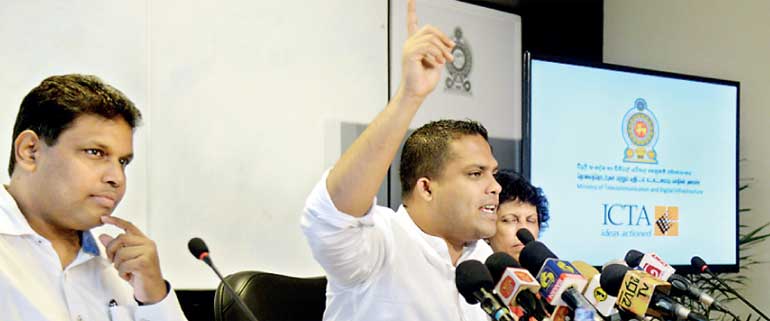Wednesday Feb 18, 2026
Wednesday Feb 18, 2026
Tuesday, 2 February 2016 00:24 - - {{hitsCtrl.values.hits}}
The Government yesterday announced that Google’s revolutionary Project Loon initiative will be tested in Sri Lanka from this month in a move aimed at providing high speed and affordable internet services even to the remotest of villages.
Following the Memorandum of Understanding signed mid - 2015 with Google, the global giant has dispatched necessary equipment to start testing the breakthrough Google Loon from February.
Google’s Loon project uses high-altitude balloons placed in the stratosphere at an altitude of about 18 kilometres or 75,000 feet to create an aerial wireless network with up to 4G-LTE speeds.
 Telecommunication and Digital Infrastructure Minister Harin Fernando gestures during the media briefing yesterday, flanked by ICTA CEO Muhunthan Canagey (left) and Chairperson Chitrangani Mubarak
Telecommunication and Digital Infrastructure Minister Harin Fernando gestures during the media briefing yesterday, flanked by ICTA CEO Muhunthan Canagey (left) and Chairperson Chitrangani Mubarak
- Pic by Shantha Ratnayake
“Depending on the results from the test which could last several months or an year, we will firm up a specific program to introduce the Google Loon project which aims to provide internet for all,” Telecommunication and Digital Infrastructure Minister Harin Fernando told the media yesterday.
The Government is backing the initiative by providing the required spectrum which Google has agreed to treat as a 25% stake in the project company. An inter-ministerial committee headed by Minister Fernando is tasked with finalising terms and conditions of the agreement with Google if tests are successful.
Fresh from a visit to Silicon Valley and a meeting with Google officials recently, the Minister said the selection of Sri Lanka by the global giant to test Google Loon was a major breakthrough for the country as well as the new Government’s vision to reduce the digital divide and steer Sri Lanka to higher socio-economic growth via Information Communication Technology.
“This is a big victory and a golden opportunity for Sri Lanka. For Google to pick Sri Lanka it confirms the global giants’ and others’ growing trust and confidence on the future of the country under the new Government,” he added.
He said Google is rolling out the Loon project to connect the two third of people who not connected globally. Selection of Sri Lanka follows successful pilot tests done in New Zealand, California and Brazil. If trials prove successful Sri Lanka will be the second country in the world to get full coverage of internet using LTE, after Vatican City.
“This is a win-win initiative,” Minister Fernando said since there had been differences of opinion at least by one telecom firm. “For mobile telecom firms further expansion means costly setting up of multiple towers. We have decided to invite telecom firms to become 10% shareholders of the project. All will stand to benefit since Google Loon is a cost effective and revolutionary initiative. If there is competition then it is better for the public,” emphasised Fernando who also noted at present Sri Lanka has the lowest call and internet charges.
ICTA CEO Muhunthan Canagey pointed out that Google Loon is a disruptive technology hence not only in Sri Lanka but elsewhere too there will be resistance from existing technology operators and business models. “The Government is keen on embracing new technology and stimulating greater innovation to create value in the country,” he added.
The Minister said global research has shown that a 10% penetration of internet leads to a 1% improvement in GDP. “This explains the far reaching benefits of a robust internet roll out as well as easy accessibility at affordable prices to people and businesses,” Fernando said. He also said internet penetration in Sri Lanka was around 26% and via Government’s digital infrastructure development plans this will be increased to 50% in the medium term.
Dismissing any concerns over harm to people, the Minister and the CEO said that the special balloons used by Google are environment friendly and recyclable. The Minister said during his meeting with Google officials, the possibility of manufacturing the special balloons in Sri Lanka was also mooted.